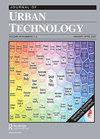2019冠状病毒病下破解企业智慧城市:迈向智慧治理方法
IF 4.4
3区 经济学
Q1 URBAN STUDIES
引用次数: 0
摘要
摘要2019冠状病毒病大流行给智慧城市带来了巨大挑战,需要对智慧城市的治理结构进行重新构想和转型。这一观点认为,在智慧城市背景下,应该采用智能治理方法来改造统一的、通常由技术官僚和企业主导的应对COVID-19的方式。有必要在各部门和各行为体之间制定更多以技术为基础的合作行动,以便更好地从大流行病中恢复过来。建立以公民为中心的开放治理能力(即城市群众参与的新兴特征)也需要有远见,以便做好准备、作出反应和长期恢复力。强调需要强有力的通信政策,以便将及时和关键的信息传递给对智慧城市转型感兴趣的一系列参与者。关键词:2019冠状病毒病信息通信技术智慧城市治理转型城市韧性披露声明作者未报告潜在利益冲突。本研究得到国家自然科学基金资助(基金批准号:no. 101no .)。42201207;72373137;52000130),中央高校基本科研业务费专项资金(批准号:52000130);310421102),北京大学-林肯研究院城市发展与土地政策研究中心青年基金(批准号:10421102);2222000255)。作者简介蒋绍雄蒋华雄北京师范大学地理科学系副教授潘浩志潘浩志上海交通大学国际与公共事务学院副教授林艳流林艳流乌得勒支大学人文地理与空间规划系副教授乌得勒支3584 CB。stan Geertman是荷兰乌得勒支大学人文地理与空间规划系教授,住址3584 CB Utrecht, Netherlands。本文章由计算机程序翻译,如有差异,请以英文原文为准。
Hacking Corporate Smart Cities Under COVID-19: Towards a Smart Governance Approach
ABSTRACTThe COVID-19 pandemic has imposed huge challenges on smart cities, requiring a reimagining and transformation of their governance structures. This viewpoint argues that a smart governance approach should be applied to remodel the uniform, often technocratic and corporate-led way of coping with COVID-19 in the smart city context. There is a need to develop more technology-enabled collaborative actions across sectors and among various actors to recover better from the pandemic. A far-sighted view is also needed to build citizen-centric open governance capacities—the emergent character of mass participation in cities—for readiness, responsiveness, and long-term resilience. The need for a robust communication policy is highlighted to transmit well-timed and critical information to a range of actors interested in smart city transformation.KEYWORDS: COVID-19information and communication technologysmart city governancetransformationurban resilience Disclosure StatementNo potential conflict of interest was reported by the author(s).AcknowledgmentsThe study is supported by the National Natural Science Foundation of China (grant no. 42201207; 72373137; 52000130), Fundamental Research Funds for the Central Universities (grant no. 310421102), Youth Fund of Peking University-Lincoln Institute Center for Urban Development and Land Policy (PLC) (grant no. 2222000255).Additional informationNotes on contributorsHuaxiong JiangHuaxiong Jiang is an assistant professor in the Department of Geographical Science, Beijing Normal UniversityHaozhi PanHaozhi Pan is an associate professor in the School of International and Public Affairs, Shanghai Jiao Tong University, 200030 ShanghaiYanliu LinYanliu Lin is an associate professor in the Department of Human Geography and Spatial Planning, Utrecht University, 3584 CB Utrecht, the NetherlandsStan GeertmanStan Geertman is a professor in the Department of Human Geography and Spatial Planning, Utrecht University, 3584 CB Utrecht, the Netherlands.
求助全文
通过发布文献求助,成功后即可免费获取论文全文。
去求助
来源期刊

Journal of Urban Technology
URBAN STUDIES-
CiteScore
8.50
自引率
4.20%
发文量
42
期刊介绍:
The Journal of Urban Technology publishes articles that review and analyze developments in urban technologies as well as articles that study the history and the political, economic, environmental, social, esthetic, and ethical effects of those technologies. The goal of the journal is, through education and discussion, to maximize the positive and minimize the adverse effects of technology on cities. The journal"s mission is to open a conversation between specialists and non-specialists (or among practitioners of different specialities) and is designed for both scholars and a general audience whose businesses, occupations, professions, or studies require that they become aware of the effects of new technologies on urban environments.
 求助内容:
求助内容: 应助结果提醒方式:
应助结果提醒方式:


